Speakers deplore nationalism-clad Hindutva extremism
‘Pluralism vs Exclusionism: The Case of Rising Extremism in India’
Expressing deep concerns over the aggravating environment of extremism in India, experts from Pakistan and abroad censured the promotion of exclusionism in the garb of nationalism under the present government’s tenure in the country.
They were speaking at the international seminar ‘Pluralism vs Exclusionism: The Case of Rising Extremism in India’ which was organized by Institute of Policy Studies (IPS), Islamabad on February 22, 2018 at a local hotel.
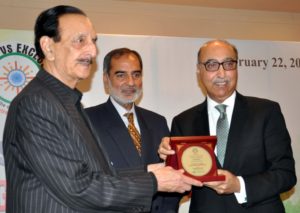 The event, which had Raja Zafar-ul-Haq, leader of the house, Senate of Pakistan, as a chief guest, was addressed as keynote speaker by Ambassador (r) Abdul Basit, former Pakistani High Commissioner to India, alongside Ambassador (r) Zamir Akram, Ambassador (r) Salman Bashir, Ambassador (r) Jalil Abbas Jilani , Dr Syed Rifaat Hussain, Dr Waqar Masood Khan, Dr Junaid Ahmad, Dr Mujeeb Afzal, Iftikhar Gilani, a prominent Indian journalist and the chief of national bureau, Daily News Analysis (DNA), Murtaza Shibli, a British-Kashmiri journalist, Ye Hailin, director, Center for Regional Security Studies, School of Advanced International and Areas Studies, East China Normal University (ECNU), China, Syed Muhammad Ali, international security expert, Air Commodore (r) Khalid Iqbal, DG-IPS Khalid Rahman, and Irfan Shahzad, research fellow at IPS.
The event, which had Raja Zafar-ul-Haq, leader of the house, Senate of Pakistan, as a chief guest, was addressed as keynote speaker by Ambassador (r) Abdul Basit, former Pakistani High Commissioner to India, alongside Ambassador (r) Zamir Akram, Ambassador (r) Salman Bashir, Ambassador (r) Jalil Abbas Jilani , Dr Syed Rifaat Hussain, Dr Waqar Masood Khan, Dr Junaid Ahmad, Dr Mujeeb Afzal, Iftikhar Gilani, a prominent Indian journalist and the chief of national bureau, Daily News Analysis (DNA), Murtaza Shibli, a British-Kashmiri journalist, Ye Hailin, director, Center for Regional Security Studies, School of Advanced International and Areas Studies, East China Normal University (ECNU), China, Syed Muhammad Ali, international security expert, Air Commodore (r) Khalid Iqbal, DG-IPS Khalid Rahman, and Irfan Shahzad, research fellow at IPS.
The sessions of the day-long event were attended by a galaxy of representatives from civil society, diplomatic circles, government officials, media and academia.
Calling exclusionism a matter that should be seen in light of human rights, Zafar-ul-Haq while addressing the seminar’s inaugural session, despised the Indian technique of promoting partisanship in the name of nationalism stating that while many countries were fighting against their own problems of exclusionism, India – which claimed to be the largest democracy and portrays itself as a secular state – keeps on fueling exclusionism by oppressing its minorities which dominantly include Sikhs, Dalits, and especially Muslims. Even the Muslims in Indian-occupied Kashmir were persistently being repressed for over seventy years, he added.
Haq pointed that the saddest part of the phenomenon was that all of this was happening under the governance of Indian Prime Minister Modi, whose leadership as a torch-bearer of Hindutva has set the exclusionism in full swing. The hatred against the Muslim has specially escalated in the prevalent Hindutva mindset and the situation was expected to get even worse in coming months in the wake of approaching Indian elections, which the ruling party BJP has traditionally used to ignite hatred against Muslims in order to consolidate their Hindu vote bank.
The senator said that though the issue of extremism is not only inherent to India as many other countries are facing it as well, the rising exclusionism in India, especially against the Muslims, deserved more condemnations as the country claims to be the largest majority that runs on the secular lines.
Ambassador (r) Basit was objective in his approach stating that the recent cases of extremism in India were not really a new phenomenon, instead the country’s history was full of cases where the minorities had to face violence and bear the brunt of exclusionism in one way or the other.
He said that though India was quick to draft its constitution and strengthen its democracy post-denomination – which was ideally supposed to give equal rights and equal opportunities to all the segments of population including minorities – the on-ground situation was in stark contrast as the country had gone on a divergent route ever-since by neither giving equal rights, nor similar opportunities to its minorities which predominantly include religious sub-sections.
The speaker highlighted three fundamental issues, which in his opinion, were the reasons behind the prevailing radicalization and the consequent socio-economic misbalance in Indian society, which in turn were resulting in creating uncertainties and societal discord.
The deeply rooted Hindu caste system, according to the speaker, was at the basis of the issue with the Hindutva mindset promoting for sectarianism and discrimination as an ideology.
Another important factor pointed by the former diplomat as a reason for prevailing extremist environment in India was that the Hindus had not been able to accept the reality that they were ruled by the Muslims for over 900 years. As a consequence of this inherent complex, they were now attempting to distort or skip the important parts of the history which they were not able to digest. He presented the names of various places in India as a proof of his argument which were renamed off-late to suit the Hindutva narrative.
The creation of Pakistan was termed the third contributing factor in the given context by the speaker who said that the prevailing hatred against Muslims as well as Pakistan in the country was evident in several cases where even the prominent Muslims personalities in India were asked by extremist elements to go to Pakistan despite their neutral background.
Following the recent rise of extremism, the former ambassador said on the back of his personal interactions in India that even the Hindus in the country were ominous about the country’s future under the present leadership whereas the minorities also had deep-rooted concerns of their own. As a flag-bearer of Hindutva mindset, the pre-election anti-Muslim vehemence will help BJP consolidate the anti-Muslim vote, whereas the re-election of the same leadership can result in the eruption of violence against Muslims.
The speaker also expressed his apprehensions while trying to foresee the intensified state of extremism in India if the country continued to be ruled by the likes of the present regime and/or on the similar lines.
Studying the matter from different angles, the speakers of the seminar’s plenary session ‘Extremism in India: Faces and Dimensions’ – which included the session’s chair Dr Syed Rifaat Hussain, moderator Air Commodore (r) Khalid Iqbal, and speakers Dr Waqar Masood Khan, Syed Iftikhar Gilani, Murtaza Shibili, Dr M Mujeeb Afzal and Irfan Shehzad – deliberated upon the origin, future and implications of Hindutva. It was estimated that at least for some more time the Hindutva will continue to rise – a happening that will not only be unbecoming for the minorities in India, but for the country itself as well, as eventually this will weaken the country from the inside. The evolving situation was also termed dangerous for Pakistan as well as for the rest of the world as ultimately it had the potential to threaten the global peace.
The fact that presently there was not a single university program or a think tank in Pakistan which was dedicated to looking at the mentioned Indian thought process and design was also lamented in the session; and hence the establishment of such an institution was strongly stressed.
Chaired by Ambassador (r) Jalil Abbas Jilani, moderated by Dr Junaid Ahmad, and addressed by the panel of experts including Syed Iftikhar Gilani, Murtaza Shibli, and Air Cdr (r) Khalid Iqbal, the lively first breakout session ‘Rising Hindutva: Responses from Within’ viewed that sadly no concrete measures were being taken in India to protect the rights of its minorities. Though there were some commissions made to assess the state of minorities in India, their recommendations – such as Sachar Commission’s report – were never paid heed to.
The panelists also observed that presently all pillars of state including the judiciary as well as the legislature were playing their part in promoting extremism whereas the government policies being currently manifested and implemented in India were also supporting Hindutva. While the removal of several Muslim symbols in India was shared as one of the examples of this happening, it was feared that the situation of minorities in India, and especially that of Muslims, was only going to become increasingly vulnerable in such circumstances.
The second break out session ‘Rising Hindutva: Responses from the World’s Community’ – which was chaired by Dr Waqar Masood Khan, moderated by Syed Muhammad Ali, and addressed by Ambassador (r) Abdul Basit, Ambassador (r) Salman Bashir, Dr. Syed Rifaat Hussain, and Ye Hailin – attempted to look at the external behavior of India at the regional and global level as well as the response of the world community.
The thought provoking session reflected the disdain of the international community as well as the growing instability and the concerns at the regional level. The moral and ethical stance of international community over matters like Kashmir were stressfully questioned while the need was seen to apprise the international community about the ground realities, as well as the significance, intensity and consequences of the rise of Hindutva.
DG-IPS Khalid Rahman finally summed up the day’s proceedings by requoting and reemphasizing over the perceptive statement from Senator Raja Zafar-ul-Haq’s earlier speech which stated that no political, social or economic agendas should justify discrimination and extremism, whereas the modern democracies like India must needed to display the art of carrying all segments of society together under one umbrella of tolerance, rights and justice.


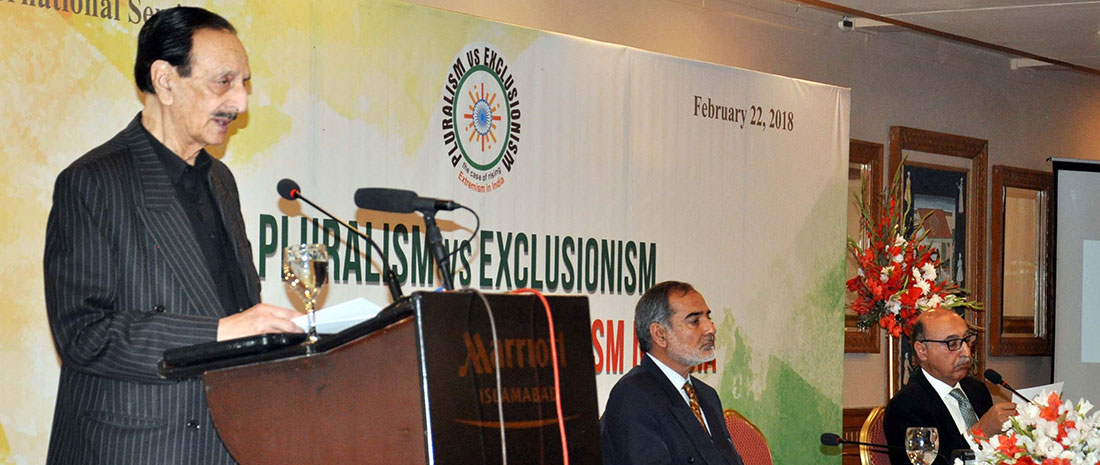
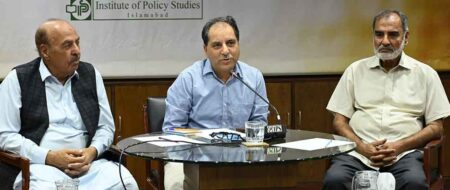







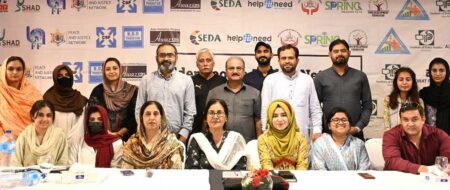
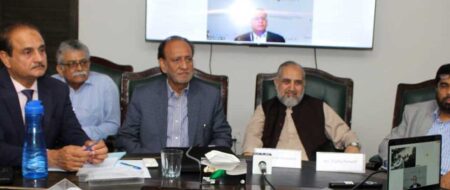
Comment (1)
Thanks for sharing .
Comments are closed.